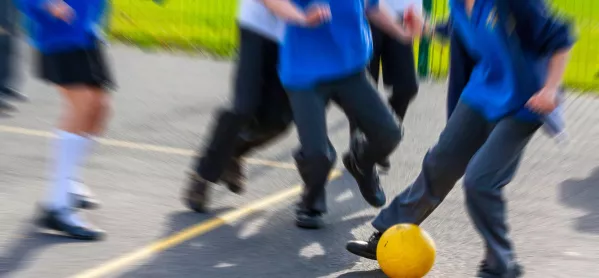A headteachers’ leader has said that government’s policy priorities are to blame for the number of hours of PE being taught in secondary schools falling.
General secretary of the Association of School and College Leaders Geoff Barton said moves to make the curriculum more academically focused through measures such as reforming GCSEs and creating the English Baccalaureate (EBacc) have “squeezed the time available for other subjects”.
His comments come after Department for Education figures showing that the number of hours of PE and sport taught in state secondary schools had dropped from 326,277 in 2011-12 to 285,957 in 2022-23 were reported this week.
The decrease has also been criticised by the Youth Sport Trust.
‘Enormous pressure’
Mr Barton said: “The number of hours of PE taught in recent years has been broadly consistent. The fall between 2011 and 2017 is likely the result of the government’s policy objectives of making the secondary curriculum more academically focused - through measures such as the EBacc and the reform of GCSEs - which will have squeezed the time available for other subjects.
“School leaders obviously recognise the importance of sport and PE but are under enormous pressure as a result of a timetable full of different expectations from the government, which now includes an expectation to teach at least two hours of PE per week.
“New targets are not particularly helpful for schools seeking to balance their timetables to allow for a greater academic focus while also maintaining the health and wellbeing benefits of sport and PE provision.
“There are a finite number of hours in the day and there needs to be an independent curriculum review to ensure that there is a reasonable balance in the different demands on the school curriculum.”
School sport ‘valid and important’
Ali Oliver, chief executive of the Youth Sport Trust, said that fewer than half of the UK’s children meet the recommended level of 60 minutes’ physical activity a day.
“This is contributing to a nation where too many children are missing out, have poor wellbeing and lack a sense of belonging,” she added.
“The evidence is clear; unhappy and healthy children do not learn and just this week we are seeing proof of this as high levels of persistent absence and mental ill health have been cited as undermining pupils’ GCSE results.
“We need to not just give permission to schools, but actively encourage and support them to embrace PE and school sport as a valid and important part of the education and development of every child.”
The Youth Sport Trust said high-quality physical education needed a national target, with locally coordinated interventions and long-term planning to execute that vision.
The number of hours of PE taught in state secondary schools recovered slightly in 2021-22 after a drop in 2017-18, but dropped again this academic year.
“If we can reverse the trend of declining PE and physical activity within schools and implement new ways of working effectively, this will help young people’s mental and physical wellbeing, enable them to access new skills and empower them to live happier and healthier futures,” Ms Oliver said.
A Department for Education spokesperson said: “We are committed to ensuring all children have equal access to quality sport and physical education. We want schools to deliver a minimum of two hours of curriculum PE, and equal access to the same sports for boys and girls.
“To support schools to do this, we have committed over £600 million in funding over the next two years for primary schools to provide high-quality PE to all students. This is on top of up to £57 million to open up more school sport facilities outside of school hours.”





